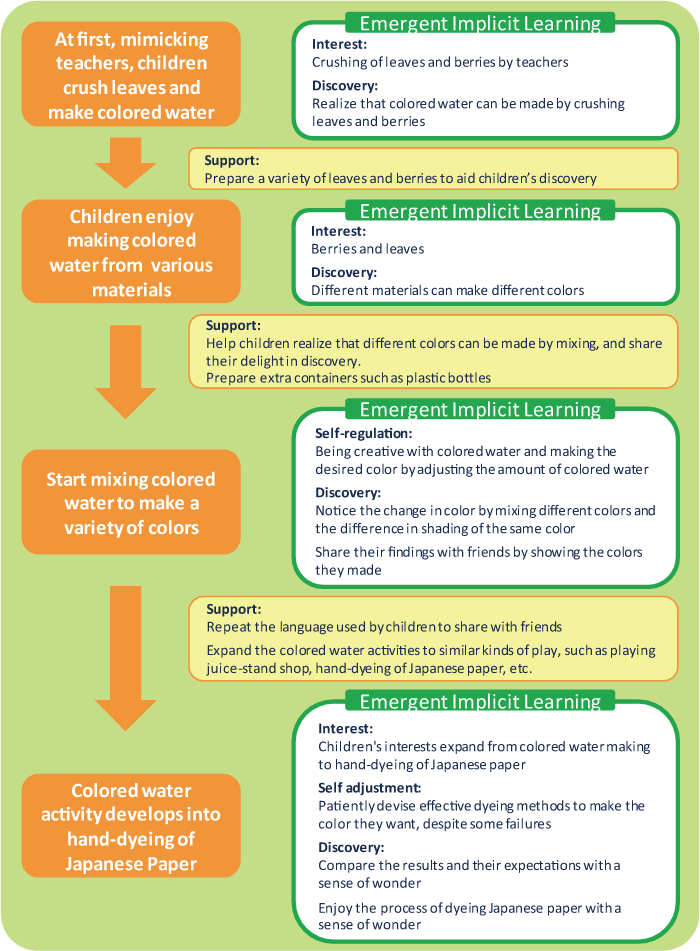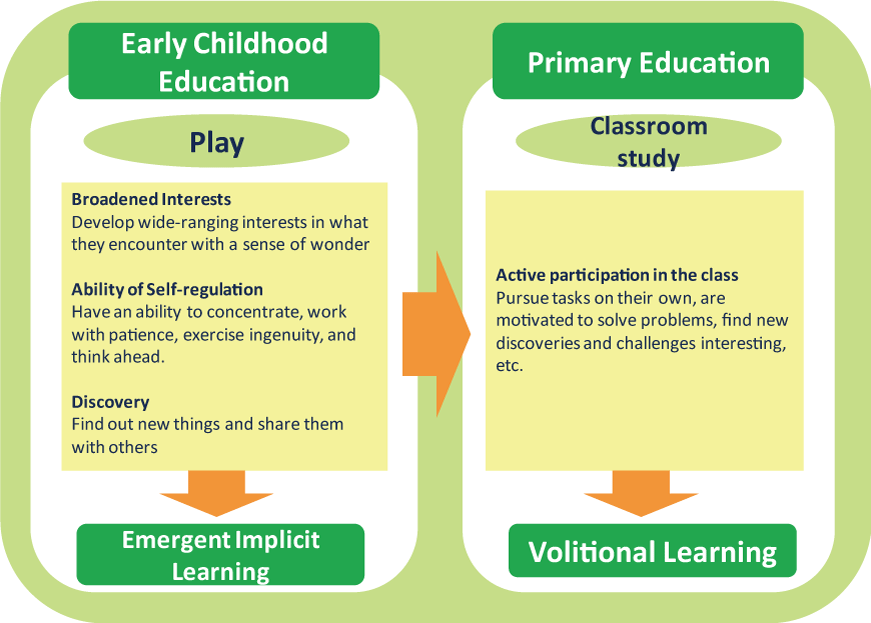This article is translated and reprinted from the Benesse newsletter, "Thinking about the Future of Infant Education," Special Issue 2012 (The contents are only available in Japanese).
Nowadays, much attention is given to cultivating an emergent implicit learning through early childhood play. What exactly does this mean and why is it so significant for children? Dr. Takashi Muto from Shiraume Gakuen University, former chairperson of the Committee on Transition from Preschool to Elementary School organized by the Ministry of Education, Culture, Sport, Science and Technology (MEXT), Japan, explained as follows.
Early childhood education--not preparation but foundation for elementary school
The primary focus of the discussion in the Committee on Transition from Preschool to Elementary School, organized by MEXT, was how early childhood education should be organized in kindergarten, nursery school, and Early Childhood Education and Care centers (ECEC centers: nintei kodomo en*1) and how it should be linked to primary education. Behind the recent increase in attention to the transition from preschool to elementary school is the so-called "first-grader problem*2." Preparatory education in kindergarten, nursery school or an ECEC center (nintei kodomo en) cannot be an adequate answer to the problem. Rather, early childhood education should be considered as the foundation for primary education and beyond, and thus teachers should support the development of each child from a long-term view.
Efforts are now being made nationwide for the smooth transition from preschool to elementary school. However, such practices still leave much to be desired. This is because an understanding of the essence of early childhood education is not fully shared among the stakeholders, mainly for the following three reasons.
First, as mentioned above, early childhood education is sometimes regarded as "preparatory education" for elementary school, entirely focusing on practice of reading, writing and simple arithmetic as well as sitting properly in a classroom for a long time. There are, of course, circumstances when such practices make sense. However, these are not the heart of early childhood education.
Second, in contrast to this, some people think that all children need to do is play. Early childhood play becomes so significant only when it involves learning in the context of the emotional development of children. Therefore, learning is long in taking place if teachers simply let them play without paying enough attention to their signs of learning.
Third, elementary schools have a tendency to lack a basic awareness that primary education is built upon early childhood education. Children usually get interested in what they encounter, realize how things work, and thus develop their ability to think as they play. In some cases, elementary schools do not attach a value to such signs of early-childhood learning, and consider that their learning begins from scratch, without a foundation.
The goal of a smooth transition from preschool to elementary school is to boost mutual understanding on both sides bringing together the positive qualities of each. By doing this, children accelerate their learning at elementary school which is grounded in their early childhood education.
Emergent implicit learning leads to volitional learning
What is important for smooth transition from preschool to elementary school is to understand how children's learning develops over time. Both preschool and elementary school need to keep in mind the important link between cultivating an emergent implicit learning in early childhood and volitional learning at lower elementary school, and provide adequate support accordingly. Emergent implicit learning refers to advancing the ways children play through the process of having fun, trying out and creating new things, and envisioning the next stage (See Figure 2 for details), which is referred to as the "interrelatedness of experience" in the kindergarten education guidelines. For instance, young children crush leaves, at first, following the lead of teachers. As the activity becomes more fun, they gradually try something different, such as crushing berries instead of leaves, or mixing colored water made from the leaves, which then leads to the goal of making different colors and dyeing. This is what we call cultivating an emergent implicit learning.
Emergent implicit learning serves as the foundation of volitional learning, which develops at an early stage of primary education. volitional learning is learning with interest and the willingness to work on tasks presented by teachers. Students become interested in the problems and feel determined to solve them. In other words, it is an ability to actively participate in lessons, not just quietly sitting in a classroom.

Play in early childhood that brings about emergent implicit learning
The way in which emergent implicit learning leads to volitional learning can be well understood through the following three aspects, namely: expansion of interest; ability of self-regulation; and discovery.
"Expansion of interest" is the way children become interested in various facets of their experience as they play. Children who fully developed this quality will be attracted to various topics taken up at elementary school, such as solving problems in math or exploring their town in life environment studies.
"Ability of self-regulation" refers to the ability to concentrate, work through an issue with persistence, become creative with the play at hand, and control oneself with a long-term perspective. It is to be developed through continuous hard work focusing on the same topic. The period spanning the age of 5 through 7 is critical to nurture this ability otherwise the "first-grader problem" tends to arise.
"Discovery" is closely related to cultivating the intellect. This is, for example, similar to the aforementioned discovery made when a child crushes berries, and with surprise, notices the color he or she has just made. The child then verbalizes this discovery, sharing it with teachers and friends. Intellectual ability gradually increases through the repeated experience of discovery and sharing.
What should be emphasized here is that the emergent implicit learning is experienced only in early childhood play. Therefore, neither preparing for elementary school nor letting children just play as they are is sufficient for early childhood education. Most of all, teachers need to support early childhood play with a conscious awareness of nurturing the interest in learning.
Learning in elementary school is the critical basis for learning that starts in junior and senior high school and continues through college and life beyond. I would like to see early childhood education regarded as the first place to start lifelong learning and children provided with best possible support accordingly, with a view to nurturing the emergent implicit learning.
- *1 Instituted in 2006, ECEC centers (nintei kodomo en) are integrated facilities that have the merits of both nursery schools and kindergarten, providing education and day care services for all preschool children.
- *2 The situation where a child does not follow the teacher's instruction and acts on his/her own in the classroom at the elementary school; as a result, the teacher cannot conduct teaching, and in the end, the function of the school as group education does not work properly for a certain period of time; and such a problem cannot be solved in the usual way by the classroom teacher alone. ("The current situation of and measures for issues concerning school management", the National Institute for Educational Policy Research, 2000)
On "Thinking about the Future of Infant Education"
Benesse provides information that will improve the quality of early childhood education and care to those involved in the field. Based on extensive research and survey data, it considers the teachers and their aims in seeking to raise the quality of child education and care together.




 Takashi Muto (Professor, Director of the Childhood Studies, Shiraume Gakuen University)
Takashi Muto (Professor, Director of the Childhood Studies, Shiraume Gakuen University)










